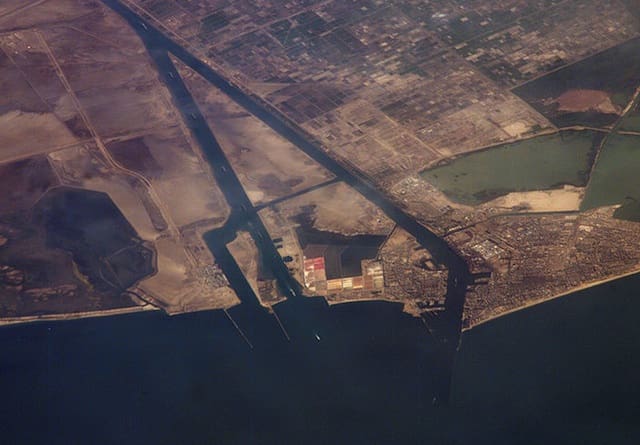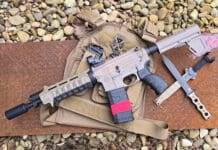It was dusk when we docked at the bustling Port Sa’id. None of the crew were permitted leave to go ashore. We topped off our diesel fuel tanks; we would be motoring through rather than traveling under sail. The Captain contracted a potbellied Egyptian canal pilot named Ibrahim to take us to port Tawfiq at the canal’s terminus. The man had a long narrow face with missing molars. He looked distinctly equine. His job was not to keep us from running aground – the canal is easily navigable. The fast-talking native was aboard for one reason: to facilitate our passage past every small town Sheikh with a couple Mausers and rowboat demanding “jizya” and every port authority, police, and military official with his palm out expecting gifts and cash. The Captain would still have to spread the wealth to these tin-pot extortionists to complete passage, but Ibrahim would hasten negotiations and minimize the ransom required.
Our assigned departure time: 0100 hours. Due to our slower speed we were placed at the tail end of the convoy of eight ships. A fast-moving French destroyer positioned at the front of the column steamed out of sight before we were clear of Port Sa’id, followed by an assortment of container and tanker vessels. Ours was the only private boat in the convoy. By dawn we had dropped out of sight of even the slowest of the merchant ships.
The clatter of the powerful Caterpillar diesel engine roared away just aft of my cabin. It kept me awake. So I got up and joined a poker game in the galley. Before dawn, we split our winnings and losses. The guys hit the rack for a couple hours of shuteye. I went topside.
It was a moonless night. The night sky was iridescent with stars. The desiccated sand amplified the light. The canal reflected silver. It stretched straight like the blade of a sword laid across the flat desert. Other than the distant grumble of the diesel engine and gentle swish of the bow cutting through the canal water, the only sound was the occasional squawk of a night bird. I could feel my lips drying out as we chugged away from the Mediterranean.
“Hey Griffith.”
It was Annie. I didn’t know she knew my name.
“Couldn’t sleep? The engine room is right behind our cabins.”
She nodded. Her cheek was visibly swollen. She gazed heavenward. A thousand galaxies glinted in the wet of her eyes.
“Starlight suits you.”
She held the palm of her hand over her bruised cheek. It was the first time I had seen her smile. It was also the first time I had seen her without a pair of cameras slung around her neck.
“Yesterday was rough,” I said.
“I’m over it. Except for this shiner.”
Annie joined me at the rail. For a moment we stared at each other. Her neck extended as she looked up at me. It was a long, elegant neck — the only thing about her that seemed vulnerable. She looked relaxed and I felt warm inside.
“Traveling like you do must be hell on relationships,” I commented without thinking.
For a moment she said nothing. A thousand thoughts seemed to stream across her mind.
“You learn to live in the moment,” she said.
So was this what it was going to be? A one night stand with a cute National Geographic photographer with lesbian hair while floating down a canal in the middle of a godforsaken desert on the far side of the world.
We would not share our life histories with each other. I would never know where she grew up or what her home town was like. She would never tell me if she and her mother were like sisters or that her father was a college professor somewhere. I would never share with her that I still didn’t know what I wanted to be when I grew up. Other than tonight, we would never be there for each other, to give advice and help pick the other up when the other stumbled. We would not have children or grow old together. Tomorrow each of us would be as alone as we were today. Only tonight. Still, I imagined wrapping my arms around her and tasting her warm kiss.
“I don’t need a man to manage my life,” she said with sudden sharpness.
“I didn’t think you did.” I smiled.
“Good.”
I held out my hand and she placed hers into it. I closed my eyes to savor that first moment of human contact. The ruckus of an approaching train along the tracks that lined the banks of the canal broke the mood. Annie turned to get a better look and strained through the darkness. Car after car, the smoke spewing engines pulled flatbeds with silhouettes of Soviet made tanks and armored personnel carriers on them.
“That’s the third military train I’ve seen tonight,” Annie said. “They’re all headed north to Port Sa’id. Dammit, we’re going the wrong way. I should be following them.”
“Looks to as if we’re leaving in the nick of time. Coups can be very . . . inconvenient.”
“Coup? I doubt it. Nasser has already thrown anyone that would dare oppose him into prison. Besides, he’s popular in the Egyptian street. No, I think we are witnessing last minute preparations for a showdown with Israel.”
“And you want to run straight into the middle of it?”
“Colombia, Mozambique, Indonesia, Algeria, Pakistan. It’s what I do. I’ve been to Vietnam twice. I’m scheduled to go back in November.”
I shook my head.
“I’m trying to do my best to avoid Vietnam.”
“And I’m trying to help end these conflicts. Have you ever seen what an AK-47 round does to a three-year-old? Or a pregnant woman torn in half by a land mine? I have.”
“So what do you do with all of the dictators and evil people of the world?”
“The world doesn’t have to be governed at the point of a sword or under the barrel of a gun. We’re outgrowing all of that.”
“Sure. Flower power.”
We came upon a small white-walled village in the Champaign pre-dawn light. Dark skinned fishermen materialized out of the darkness in glassy waist deep water to check traps tied to wooden posts standing in the shallows. Smoke rose from white-walled huts with flat roofs clustered like bleached Lego blocks. A simple white minaret spire rose from a mosque that stood on the highest point of land in the town. An unseen Imam sang an adhan in a clear voice to call his people to prayer.
“I suppose the world would be a better place if we all prayed a little more,” I said, trying to recapture the mood.
“Prayer has nothing to do with it,” Annie said.
The look on her face confirmed that she had a lecture on the tip of her tongue about how many people in the history of the world have been killed in the name of a god.
“I think I’ll get my camera,” I said preemptively.
“Me too,” she said. “Back to work.”
[Read from the Beginning here. Read the Previous chapter here. Read the Next chapter here.]




